Sometimes we aren't fully aware of greatness until the ones who embody it are gone. This is not a eulogy for Steve Jobs, and I am not a member of the world's largest cult known as Apple. I have never owned an Apple computer (although I did learn how to use a computer on the Macintosh). I don't currently own an IPad, nor do I have an IPhone. I never felt left out of the phenomenon that is the Apple craze, but the day I discovered the device called the IPod and what it could do, my world changed forever.
I grew up surrounded by music, with all members of my immediate family playing an instrument, singing or reading music. We had the requisite console stereo that played vinyl albums, which was later augmented by the 8-Track player. We were very fortunate to have an uncle who was in vending (read that anyway you want) and my parents got us our very own jukebox that played 45s. I spent my allowances on the latest releases, loading up the player to sound just like my favorite AM station. But the most significant perk was being able to control what played. It was rigged so you didn't have to put money in. And, we discovered the "eject" button in case we had a fat-finger mistake or couldn't wait to hear the latest single from The Knack. All this was novel and drove the fun at family functions, but the game changer was the all-in-one "media center" that allowed you to record from vinyl or radio to cassette or even- gasp!- from cassette to cassette! All for about $159.99 at your local Sears or K-Mart.
 Not long after that, the Walkman strode into our lives. A Star Trek tri-quarter looking device that was no bigger than a box of Crackerjax with personal mini-headphones, so much cooler than the ear sweat-inducing Princess Leia head-huggers. Now that we were all listening to cassettes, naturally, we all wanted to record our own. Blank cassettes started around 45 minutes in length- 22 1/2 minutes each side. And, that was fine, because a typical album only lasted about that long. But then came the 60 minute and 90 minute tapes. What, pray tell, do you do with these?? Soundtracks were really hot in the 70s, with movies like Animal House compiling a bunch of hit singles to make a shoulder industry out of movies along with toys, posters and other marketable tchotchke. And with that, the mixed tape was born. Favorite Love Songs. Party Rock. Christmas Hits. Best of the Beatles! Stoner Tunes. Are you kidding me? The mixed tape became an art form. Creating a mini-soundtrack that could set the mood which lasted anywhere from an hour to an hour and a half. But sadly, once you played the tape to death, you had memorized the play order and it got stale. Fast.
Not long after that, the Walkman strode into our lives. A Star Trek tri-quarter looking device that was no bigger than a box of Crackerjax with personal mini-headphones, so much cooler than the ear sweat-inducing Princess Leia head-huggers. Now that we were all listening to cassettes, naturally, we all wanted to record our own. Blank cassettes started around 45 minutes in length- 22 1/2 minutes each side. And, that was fine, because a typical album only lasted about that long. But then came the 60 minute and 90 minute tapes. What, pray tell, do you do with these?? Soundtracks were really hot in the 70s, with movies like Animal House compiling a bunch of hit singles to make a shoulder industry out of movies along with toys, posters and other marketable tchotchke. And with that, the mixed tape was born. Favorite Love Songs. Party Rock. Christmas Hits. Best of the Beatles! Stoner Tunes. Are you kidding me? The mixed tape became an art form. Creating a mini-soundtrack that could set the mood which lasted anywhere from an hour to an hour and a half. But sadly, once you played the tape to death, you had memorized the play order and it got stale. Fast.
My first job was working in the record section of a department store. Shortly after that, I worked at Wall-to-Wall Sound and Listening Booth, your one stop mall shopping for audio equipment and the latest (and oldest) hits. Having the privilege of buying music at deep discounts when you're a teenager AND at the height of a musical revolution (punk and new wave) is not only exhilarating, it's downright dangerous. Very often, I'd just hand my paycheck back to them, hoping to clear my tab from the latest vinyl binge. But, just when you've built up a formidable library worth bragging about, deep with selection and breadth like a good wine cellar, another new form of technology comes- and you start over again.
Switching to the compact disc was a no-brainer for people, because it couldn't be scratched the way a record could (and that presented its own problems for another emerging musical genre) and eliminated a crackling, gravelly sound that I never imagined I would miss. As this technology evolved, the next phase in having complete mastery over your music library came with the "shuffle" function. No longer would you have to stare blindly at the album cover and listen to the same songs in the same order ever again. Shuffle was huge. And, just when it seemed like it couldn't get any more exciting, there came the three-disc, then the five-disc and even 10-disc CD changer. A benchmark in music listening came when I could load up all of my Smiths CDs and shuffle them at once, allowing for hour upon hour of pathetic whining and self-pity. Even if owning a 10 disc player was the antithesis of suffering.
Upon announcing I wanted the new 400 disc changer with programmable remote from Sony for Christmas, my family pronounced me officially insane. But, I got it and gamely filled it completely up, creating my own categories of genres, which included 80s, Classical, Classic Jazz, Acid Jazz, World and VH1, that burgeoning category others knew as adult contemporary, but alas, a genre a thirtysomething didn't want to admit to owning.
Sony jumped right on the dwindling interest in the Walkman and created a device the size of a Big Mac capable of playing single compact discs (also with shuffle) aptly named the Discman. How could this little metallic sandwich produce the kind of intense sound as my full-size stereo, all while I clocked 3 miles on a treadmill?? (Author's note: just because you can use it on a treadmill, doesn't mean you should. Wipeouts are expensive, but not nearly as damaging to your ego as when the entire gym watches you go down in flames and your player belches the disc across the room as a final indignity.)
CDs were smaller and lighter, and thus easier to store. No longer did you have to schlep a pleather suitcase of mixed tapes around on a vacation, getaway or long roadtrip. Neatly compacted, zip-up books with plastic sleeves could hold 100 cds, and it took up no more space than a phone book. To drag 100 cds all the way to Europe while attempting to travel light seems nerdish and excessive, that is, of course, until you whip out the perfect dinner jazz album watching the sunset on the Basque coast. Or have the ultimate disc to fall asleep to when you can't. Or need to access the right party tunes, when one unexpectedly crops up- you become a hero, a Renaissance DJ. Close friends know I used to travel to dinner parties, friends homes and the occasional after-hours gig with my own music.
The only thing I thought was left to evolve in this ever-changing universe of musical convenience was creating a recordable compact disc. That was it: copy your music (or your friend's music) onto a disc that you could load onto a multiple disc player? Or, record your old vinyl back onto disc, retaining that golden sound of yesteryear (even if the mid-section had been completely gutted out by the transfer of analog to digital). And, finally, using a mixer board to create seamless tracks of beat-mixed music while burning your own copy?? Bonanza!
The technology was evolving exponentially now. The new way of obtaining music was to get a computer with a fast enough internet connection so you could download a large file known as an MP3 that mimicked the ones that were created by the record companies for disc format. It seemed like the computer was poised to become the new jukebox- the future of condensed listening. No actual tangible disc to insert, just tiny bytes of compressed information magically making music out of digital information. Napster and Kazaa music-sharing services changed the way we thought about obtaining music. They created a huge shake-up in traditional music sales. It seemed everyone could get it, very often for free, and at a time when there were hardly any rules to the internet, let alone rules about digital file sharing.
It was a chaotic period. Formats were changing so quickly, no one wanted to spend their money anymore on re-replacing their music libraries- so they went where they could get the latest incarnation- and for free. Online file sharing. Musicians and record executives were crapping themselves, wondering how they would be able to survive when their final product had become something you couldn't hold, didn't need packaging for, could easily be shared with millions and no one to govern the dozens of sites that were giving it away for free (see Radiohead for how that turned into a plus for the band).
I owned every last one of these devices and gadgets. Some improved upon design, some on price. I flirted with free downloading and creating a library of MP3s. But, it seemed like I was starting over, yet again.
"Someone needs to figure this shit out," I thought.
I had heard only tangentially about the Ipod, but I was mostly convinced they were the next Mini-Disk player, a lead balloon if ever there was one in the progression of music players. My first encounter with an Ipod was a wedding gift I had received from a friend who is the biggest Applemaniac I know. I was not interested in being converted to the Apple way, so I proceeded skeptically. I also knew there were proprietary drawbacks that made me scoff even further.
The packaging was an eyebrow raiser: smooth, clean, minimal and compact. The first generation Ipod resembled a futuristic passport or high-tech pacemaker. Still, I was not sold. With only one port for listening and one for charging, I wondered how it would actually work. And I wondered. And wondered. There was no manual on how to operate the damn thing! Am I supposed to just "get" what to do? I bought the Missing Manual and spent days with my Ipod, laptop and guide hoping a light bulb would go on. Ripping, burning, uploading, file conversions- WTF- I was pissed. And what's with these earbuds? I had the thing a week before there was any music on it. Most of the problems arose from not knowing where the music was going once it was transferred to the hard drive. And so, even though it was foretold the songs would go directly into my Music Match Jukebox (the software that would run it), it became clear, Apple had not made the MMJ, and thus, there were some square peg-round hole issues. I had to use their software (Itunes) for this to really work.
But then it clicked- I could rip 10 albums a half hour to my hard drive! They would go instantly to my Ipod upon plugging it in. All my previously pirated files from Napster would upload in an instant of dropping and dragging. And they were all alphabetized! And put into genres! And I could click one button and browse by artist or song! Eureka! A revelation. The first generation IPod was 5 gigabytes, capable of holding some 1000 songs right in your pocket!
This was the moment I had been waiting my whole life for.
Every hurdle to the perfect listening device had been cleared. I held in my hand the soundtrack to my life, which I could take anywhere, and with one very simple patch cord, I could plug it into any stereo, old or new. I could plug in computer speakers and listen. I could rock out the surprisingly efficient earbuds, or buy up to the noise-cancelling DJ version. I could transfer all my music- vinyl, CD, MP3- into one neatly organized, efficient and flexible digital card catalog. I already owned a cassette converter for my Discman- so I could listen to my IPod in the car, as well. I even read in my manual there was a super-secret feature that could record voice (and it did!). Switch to disc mode and I could store files like Christmas shopping lists. And you could strap it onto your arm and run, jump, roll and flail about without creating a public incident (well, it didn't affect the Ipod, let's say). In place of the mixed tape came the "playlist"; as easy to make by dropping and dragging songs on your computer as it was by double-clicking the songs on the device itself. No time limits, no duplicates, and fully shuffleable depending on my mood. This was the Holy Grail for me.
Naturally came the proliferation of Ipod products: The ITunes Store, Ipod docking stations, different colored cases and earbuds, car radio adapters- it was time to diversify. As Apple started to put their tiered pricing into place, they realized they could make these things smaller and thinner, they could hold more data and they could keep the price about the same, or make it less for people who couldn't afford the big boy. Variations like the Mini, the Nano,and the Shuffle; a Genius button, full color screens, picture files, video, whole movies- HOLY CRAP! SLOW DOWN!! Finally- and inevitably- the IPhone was born, merging just about everything a hand held device ever was into one. I don't own an IPhone, and again- I don't want one. But, evolution marched on.
Ten years later, I'm on my fourth Ipod and it's still an Ipod Classic- 6th Generation, with 80 gigs of storage, capping out at just around 15,000 songs. I've since dumped all my pictures and video so I can store more music. And, I'm already preparing to step-up to the next level, the 7th Generation Ipod which holds 160G of information. It's rumored to be the last of the Classic Ipods.
I take my RoPod with me everywhere. It's another limb. An angel on my shoulder. My orchestra in the pit. My musical muse.
Were the Pharoahs of ancient Egypt alive today, I'd want to give as much credit to the slaves who built the pyramids, and not just the architects. And so it is that I thank anyone and everyone who made the Ipod possible. Not the least of whom was Steve Jobs.

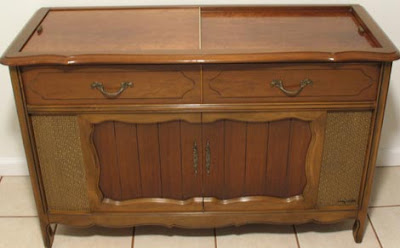
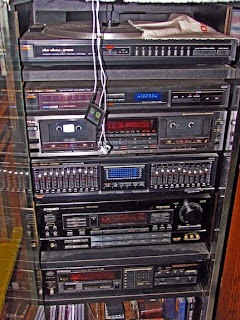
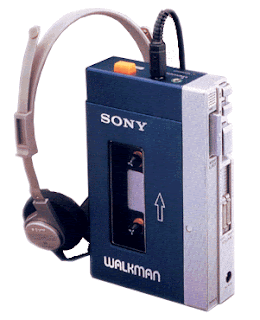

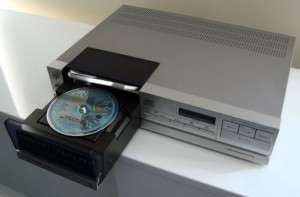
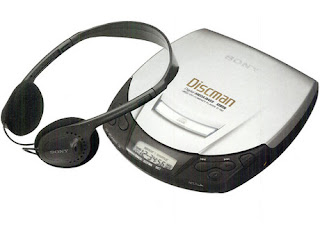

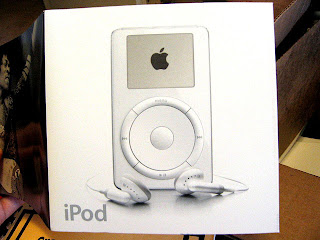
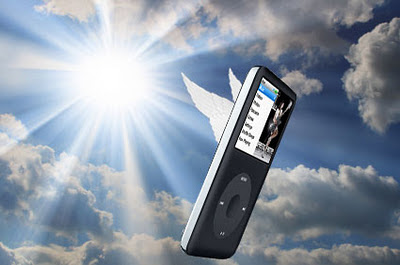
1 comment:
'[CHEAP ACCESS]is not only exhilarating, it's downright dangerous."
Your Blog continues to put a smile on my face! Thanks Rob for bringing back the memory of you basement Juke Box and the Wall-to-Wall sound!
Post a Comment